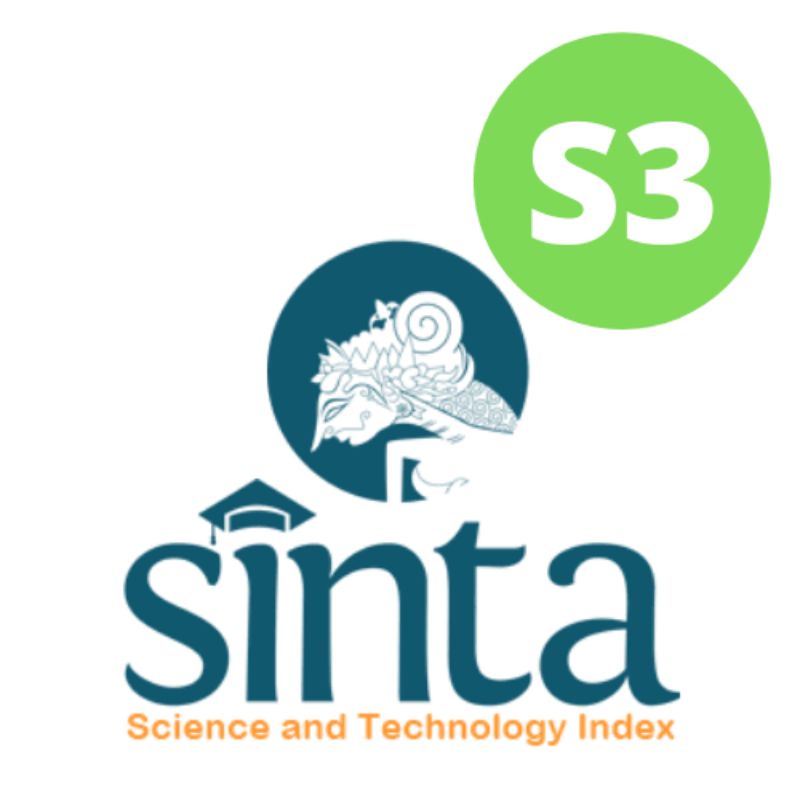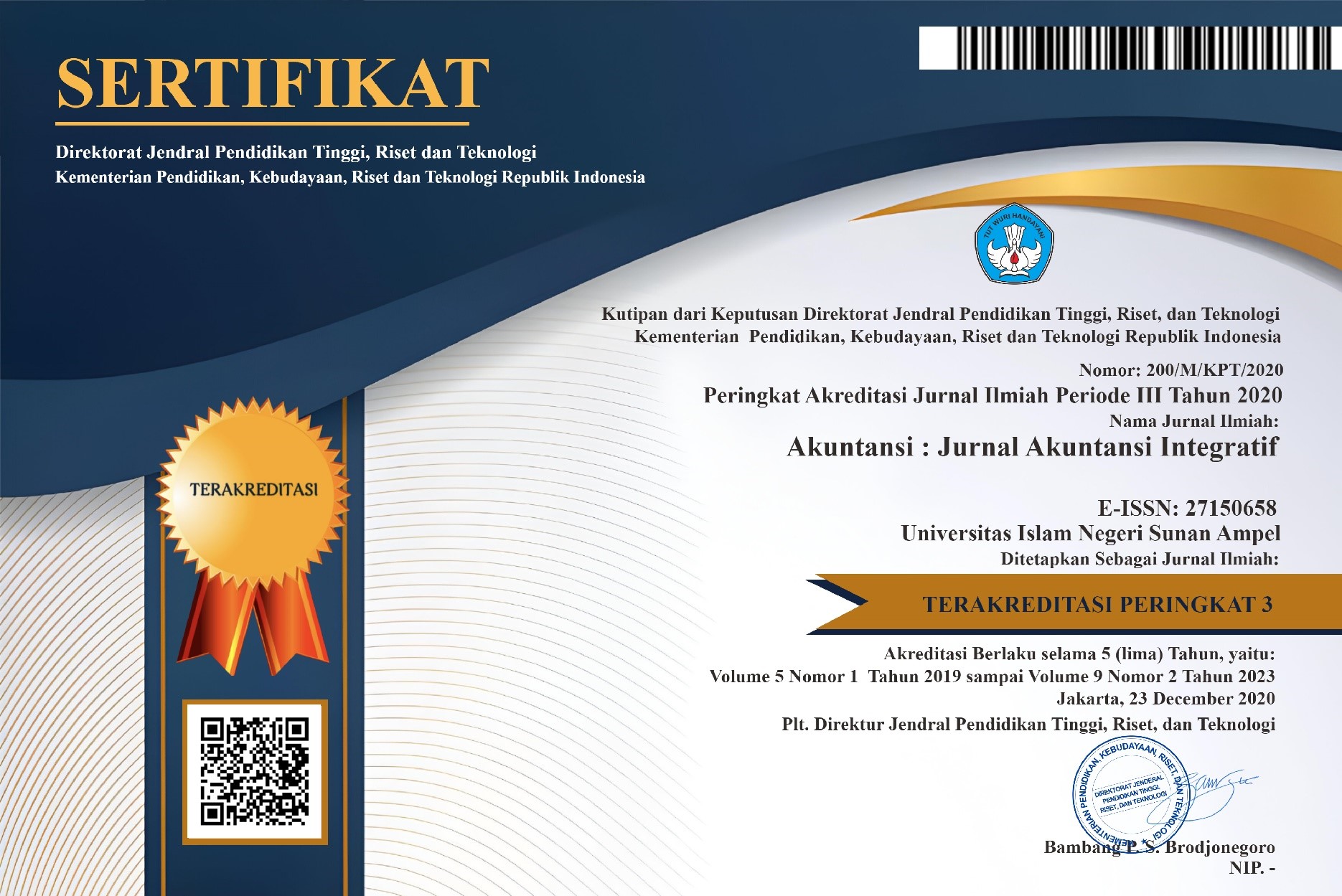Profit Quality Analysis of Investment Opportunity Set, Leverage, and Good Corporate Governance
DOI:
https://doi.org/10.29080/jai.v9i2.1503Keywords:
good corporate governance, leverage, profit quality, investment opportunity setsAbstract
This research is motivated by the company's investment decisions during the pandemic to increase its business scale in the future which gives investor’s confidence in making financial decisions. The purpose of current study is to investigate how profit quality is impacted by good corporate governance, leverage as well as investment opportunity sets. The DER was used to measure the leverage, the market book value of asset ratio was used to measure the IOS, and the proportion and quantity of firms' ownership of the audit committee, independent commissioner board, managerial ownership, and institutional ownership were all used to measure GCG. It was a quantitative study. Food and beverage businesses that were listed on the IDX (Indonesia Stock Exchange) also made up the population. The method of gathering data employed purposive sampling. 13 businesses made up the sample in accordance with that. Moreover, the data was collected during a three-year period (2019–2021). 39 pieces of data in all were examined. The t-test, F-test, R2 test, and multiple linear regression were also employed in the data analysis technique. The outcome showed that there was a negative correlation between profit quality and the set of investment opportunities. On the other hand, managerial ownership improved the quality of profits. On the other hand, the quality of profits was unaffected by leverage, institutional ownership, the independent commissioner board, and the audit committee. These results imply the failure of all sample firms to achieve positive returns on their investment sets in assets during the pandemic. Not a single firm was able to show positive prospects for investment opportunities during the pandemic.
Downloads
References
Abbott, Lawrence J., Susan Parker, Gary F. Peters, and K. Raghunandan. 2003. “The Association between Audit Committee Characteristics and Audit Fees.” Auditing: A Journal of Practice & Theory 22 (2): 17–32. https://doi.org/10.2308/aud.2003.22.2.17.
Agustia, Dian. 2013. “Pengaruh Faktor Good Corporate Governance, Free Cash Flow, Dan Leverage Terhadap Manajemen Laba.” Jurnal Akuntansi Dan Keuangan. https://doi.org/10.9744/jak.15.1.27-42.
Al-Absy, Mujeeb Saif Mohsen. 2020. “The Board Chairman’s Characteristics and Financial Stability of Malaysian-Listed Firms.” Edited by Collins G. Ntim. Cogent Business & Management 7 (1): 1823586. https://doi.org/10.1080/23311975.2020.1823586.
Alkilani, Saleh Zaid, Wan Nordin Wan Hussin, and Basariah Salim. 2019. “Impact of Ownership Characteristics on Modified Audit Opinion in Jordan.” International Journal of Accounting, Finance and Risk Management 4 (3): 71. https://doi.org/10.11648/j.ijafrm.20190403.11.
Alzoubi, Ebraheem Saleem Salem. 2016. “Ownership Structure and Earnings Management: Evidence from Jordan.” International Journal of Accounting & Information Management 24 (2): 135–61. https://doi.org/10.1108/IJAIM-06-2015-0031.
Amosh, Hamzeh Al, and Saleh F.A. Khatib. 2022. “Ownership Structure and Environmental, Social and Governance Performance Disclosure: The Moderating Role of the Board Independence.” Journal of Business and Socio-Economic Development 2 (1): 49–66. https://doi.org/10.1108/JBSED-07-2021-0094.
Andriani, Budi, Mahfud Nurnajamuddin, and Khairina Rosyadah. 2021. “Does Profitability, Firm Size, and Investment Opportunity Set Affect Earnings Quality?” Jurnal Akuntansi 25 (1): 54. https://doi.org/10.24912/ja.v25i1.724.
Arif, Muhammad, Aymen Sajjad, Sanaullah Farooq, Maira Abrar, and Ahmed Shafique Joyo. 2021. “The Impact of Audit Committee Attributes on the Quality and Quantity of Environmental, Social and Governance (ESG) Disclosures.” Corporate Governance: The International Journal of Business in Society 21 (3): 497–514. https://doi.org/10.1108/CG-06-2020-0243.
Bhuiyan, Md. Borhan Uddin, and Mabel D’Costa. 2020. “Audit Committee Ownership and Audit Report Lag: Evidence from Australia.” International Journal of Accounting & Information Management 28 (1): 96–125. https://doi.org/10.1108/IJAIM-09-2018-0107.
Dang, Hung Ngoc, and Cuong Duc Pham. 2022. “The Effects of Earning Quality on Sustainable Reports: An Empirical Study from Vietnam.” Economic Research-Ekonomska Istraživanja 35 (1): 6705–22. https://doi.org/10.1080/1331677X.2022.2053360.
Demsetz, Harold, and Kenneth Lehn. 1985. “The Structure of Corporate Ownership: Causes and Consequences.” Journal of Political Economy 93 (6): 1155–77. https://doi.org/10.1086/261354.
Detthamrong, Umawadee, Nongnit Chancharat, and Chaiporn Vithessonthi. 2017. “Corporate Governance, Capital Structure and Firm Performance: Evidence from Thailand.” Research in International Business and Finance. https://doi.org/10.1016/j.ribaf.2017.07.011.
Dewi, Aminar Sutra, Desfriana Sari, and Henryanto Abaharis. 2018. “Pengaruh Karakteristik Dewan Komisaris Terhadap Kinerja Perusahaan Manufaktur Di Bursa Efek Indonesia.” Jurnal Benefita 3 (3): 445. https://doi.org/10.22216/jbe.v3i3.3530.
Duarte, Ana Filipa, Inês Lisboa, and Pedro Carreira. 2022. “Does Earnings Quality Impact Firms’ Performance? The Case of Portuguese SMEs from the Mold Sector.” Journal of Financial Reporting and Accounting, May. https://doi.org/10.1108/JFRA-12-2021-0444.
Ghozali, Imam. 2018. Aplikasi Analisis Multivariate Dengan Program SPSS 25. Edisi 9. Semarang: Badan Penerbit Universitas Diponegoro.
Gunawan, Cindy Calista, and Fidiana Fidiana. 2021. “Good Corporate Governance and Intellectual Capital: Evidence from Corporate Governance Perception Index.” Assets: Jurnal Akuntansi Dan Pendidikan 10 (1): 23. https://doi.org/10.25273/jap.v10i1.5326.
Houcine, Asma, and Walid Houcine. 2020. “Does Earnings Quality Affect the Cost of Debt in a Banking System? Evidence from French Listed Companies.” Journal of General Management 45 (4): 183–91. https://doi.org/10.1177/0306307020916296.
Istianingsih. 2021. “Earnings Quality as a Link between Corporate Governance Implementation and Firm Performance.” International Journal of Management Science and Engineering Management 16 (4): 290–301. https://doi.org/10.1080/17509653.2021.1974969.
Kallapur, Sanjay, and Mark A. Trombley. 2001. “The Investment Opportunity Set: Determinants, Consequences and Measurement.” Managerial Finance 27 (3): 3–15. https://doi.org/10.1108/03074350110767060.
Khasanah, Hidayatul, and Muhammad Khafid. 2020. “IOS, Company Characteristics and Board of Commissioners’s Effect on Earnings Quality with Intervening Variable Earnings Persistence.” Accounting Analysis Journal 9 (1): 46–52. https://doi.org/10.15294/aaj.v9i1.29539.
Leipziger, Deborah, and Deborah Leipziger. 2019. “The OECD Principles of Corporate Governance.” In THE CORPORATE RESPONSIBILITY Code Book. https://doi.org/10.4324/9781351281041-27.
Maghfiroh, Ulya Annisa’ul, and - Fidiana. 2019. “Manajemen Laba, Profitabilitas, Dan Likuiditas Sebagai Peringkat Obligasi.” Journal of Research and Applications: Accounting and Management 3 (3). https://doi.org/10.18382/jraam.v3i3.203.
Marheni, Marheni. 2018. “Linkage Investment Opportunity Set (IOS) with Financial Policy in Growing Companies in Indonesia Stock Exchange (BEI).” Integrated Journal of Business and Economics 2 (1): 84. https://doi.org/10.33019/ijbe.v2i1.61.
Matos, Pedro. 2020. ESG and Responsible Institutional Investing Around the World: A Critical Review. United Stated: The CFA Institute Research Foundation.
Nukala, Vasishta Bhargava, and S. S. Prasada Rao. 2021. “Role of Debt-to-Equity Ratio in Project Investment Valuation, Assessing Risk and Return in Capital Markets.” Future Business Journal 7 (1): 13. https://doi.org/10.1186/s43093-021-00058-9.
Peasnell, K. V., P. F. Pope, and S. Young. 2000. “Detecting Earnings Management Using Cross-Sectional Abnormal Accruals Models.” Accounting and Business Research 30 (4): 313–26. https://doi.org/10.1080/00014788.2000.9728949.
Pramaiswari, Gelia Ayu, and Fidiana Fidiana. 2023. “Pengaruh Profitabilitas, Capital Intensity Dan Corporate Governance Terhadap Tax Avoidance.” Jurnal Ilmu Dan Riset Akuntansi 12 (3): 1–19.
Rezaee, Zabihollah, and Ling Tuo. 2019. “Are the Quantity and Quality of Sustainability Disclosures Associated with the Innate and Discretionary Earnings Quality?” Journal of Business Ethics 155 (3): 763–86. https://doi.org/10.1007/s10551-017-3546-y.
Sakawa, Hideaki, and Naoki Watanabel. 2020. “Institutional Ownership and Firm Performance under Stakeholder-Oriented Corporate Governance.” Sustainability 12 (3): 1021. https://doi.org/10.3390/su12031021.
Silvola, Hanna, and Eija Vinnari. 2021. “The Limits of Institutional Work: A Field Study on Auditors’ Efforts to Promote Sustainability Assurance in a Trust Society.” Accounting, Auditing & Accountability Journal 34 (1): 1–30. https://doi.org/10.1108/AAAJ-02-2019-3890.
Sujoko, Sujoko, and Ugy Soebiantoro. 2017. “Pengaruh Struktur Kepemilikan, Strategi Diversifikasi, Leverage, Faktor Intern Dan Faktor Ekstern Terhadap Nilai Perusahaan (Studi Empirik Pada Perusahaan Manufaktur Dan Non Manufaktur Di Bursa Efek Jakarta).” EKUITAS (Jurnal Ekonomi Dan Keuangan) 11 (2): 236. https://doi.org/10.24034/j25485024.y2007.v11.i2.2236.
Suranta, Sri, and Faiz Alafi S. 2018. “Pengungkapan Akuntansi Sumber Daya Manusia Dan Kinerja Keuangan Perusahaan.” Jurnal Akuntansi 6 (1): 62–74. https://doi.org/10.24964/ja.v6i1.579.
Suryanto, Tulus. 2017. “Manajemen Laba Pada Bank Syariah Di Indonesia: Peran Komite Audit Dan Dewan Pengawas Syariah.” KINERJA 18 (1): 90. https://doi.org/10.24002/kinerja.v18i1.520.
Trafalgar, Jhonatan, and Laely Aghe Africa. 2019. “The Effect of Capital Structure, Institutional Ownership, Managerial Ownership, and Profitability on Company Values in Manufacturing Companies.” The Indonesian Accounting Review 9 (1). https://doi.org/10.14414/tiar.v9i1.1619.
Tseng, Chun Yao, and Yeong Jia James Goo. 2005. “Intellectual Capital and Corporate Value in an Emerging Economy: Empirical Study of Taiwanese Manufacturers.” R and D Management. https://doi.org/10.1111/j.1467-9310.2005.00382.x.
Welch, Ivo. 2011. “Two Common Problems in Capital Structure Research: The Financial-Debt-To-Asset Ratio and Issuing Activity Versus Leverage Changes.” International Review of Finance 11 (1): 1–17. https://doi.org/10.1111/j.1468-2443.2010.01125.x.
Zamri, Norhayati, Rahayu Abdul Rahman, and Noor Saatila Mohd Isa. 2013. “The Impact of Leverage on Real Earnings Management.” Procedia Economics and Finance 7: 86–95. https://doi.org/10.1016/S2212-5671(13)00222-0.
Downloads
Published
How to Cite
Issue
Section
License
Copyright (c) 2023 Indry Maura Kusuma Wardani, Fidiana Fidiana

This work is licensed under a Creative Commons Attribution-ShareAlike 4.0 International License.









